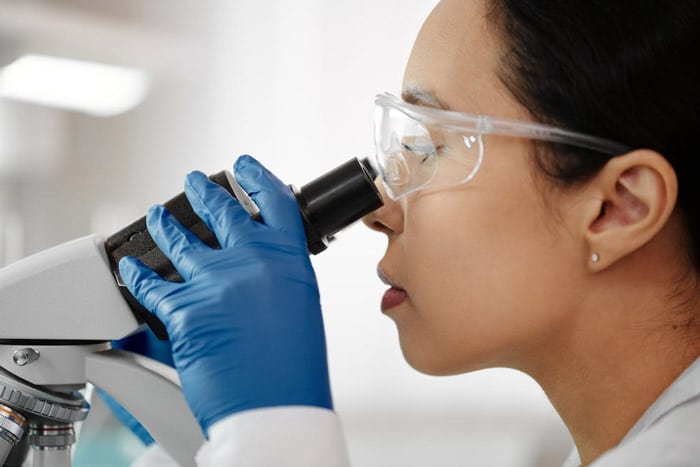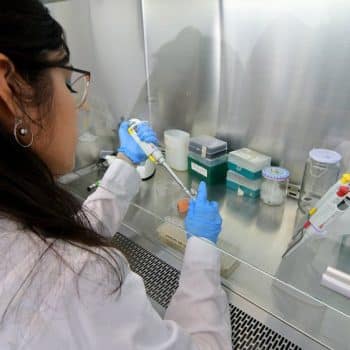
This post provides detailed information on the microbiologist job description, including the key duties, tasks, and responsibilities they commonly perform.
It also highlights the major requirements that most employers/recruiters may want candidates for the microbiologist role to fulfill to be hired.
What Does a Microbiologist Do?
The microbiologist job description entails conducting microbiological tests and analysis on raw products, in-process materials, human consumable items, and other media samples.
They measure, identify, and monitor the microbiological quality of food, water, pharmaceuticals and other materials to ensure they are safe for human use.
The microbiologist job description includes categorizing and identifying microorganisms in order to detect any potential contamination.
It also involves studying the way microorganisms behave, grow, or interact with each other.
They may identify hazards that can cause product degradation or even illness in people who consume the products being tested by them.
As a microbiologist, you may also develop protocols and procedures on how to properly handle, store, and transport samples.
They may also conduct internal or external audits on the quality of sampled products.
It is the duty of the microbiologist to perform tests in a laboratory setting or be required to provide services at various sites in the area.
Writing reports about the findings of their analysis and presenting those findings to colleagues, clients, and supervisors are also among the duties of microbiologists.
Microbiologists are not limited to working in a laboratory setting as they can be assigned tasks outside of the laboratory.
They can collect food samples from various sites to bring back to their laboratories for testing purposes.
Their role may also involve formulating and developing procedures for conducting microbiological testing.
More on Microbiologist Job Description
They may also operate and maintain laboratory equipment, or be required to develop and modify new tools of the trade.
The microbiologist duties may include training other workers on the proper use of instruments and equipment used in the laboratory.
It entails providing consulting services to other parties that have a need for someone to help them with their microbiological tests.
Microbiologists ensure that procedures are followed in the proper way in their laboratories.
They may also be involved in developing and updating laboratory manuals and writing articles relating to microbiological techniques.
This may be submitted to the relevant scientific journals.
Microbiologist Job Description Sample/Example/Template
The microbiologist job description involves the following duties, tasks, and responsibilities:
- Collecting samples of food, clothing, and other consumable items
- Testing them using state-of-the-art equipment to ensure they are safe for human consumption
- Entering information and creating reports of testing results. This is to accurately identify any potential threats that may affect people from different products
- Working closely with other professionals, such as control technicians, plant manager, quality assurance agents, and raw materials in-processions review engineers. This is to ensure that the quality of their work is up to standard
- Training other workers on proper handling procedures when dealing with raw materials and consumable items. This is to minimize any health issues or contamination that may occur in food produced by factories or laboratories
- Taking pictures of samples that show signs of contamination and comparing them to pictures of similar samples from previous tests. This is to determine whether the contamination occurs regularly or only in a limited number or samples
- Writing and submitting articles on new microbial testing equipment or procedures that have been invented. This is to share knowledge with other workers in the field
- Preparing reports for superiors on issues that have arisen during their tests. This includes identifying any potential contamination that may have occurred during the shipping process and also evaluating whether there are any safety issues with certain products that need to be addressed immediately
- Monitoring of employees to ensure they are abiding by all of the rules and regulations set forth by local health authorities.
- Making sure they comply with all new policies issued by the organization they work for. This includes changing uniforms when specific material is tested or upgrading some of their equipment when required.
Microbiologist Job Description for Resume
If you are making a resume/CV for a new position as someone who has worked in the position of a microbiologist before, or are presently working in that role, you can make a compelling resume by highlighting that experience in your resume’s Professional Experience section.
You can write an effective Work Experience section for your resume/CV by utilizing the microbiologist duties and responsibilities from the sample job description above.
This will show to the recruiter/employer that you have been successful performing the role of a microbiologist, which can significantly boost your chances of being invited to an interview or given the job, especially if the new position that you are applying for requires candidates to have some microbiologist work experience to be hired.
Microbiologist Requirements: Skills, Knowledge, and Abilities for Career Success
If you are seeking the microbiologist job, here are major requirements you may be expected to meet to be hired:
- Good knowledge of scientific principles, microbiology, and biology, with a firm grasp of the latest scientific literature available in their field
- Ability to perform laboratory tasks and procedures, including calibration of instruments and equipment that will be utilized while performing tests
- Holds a Ph.D. in Microbiology, or at least working on attaining one (a Master’s Degree in the subject will suffice if a Ph.D. is currently not available)
- An understanding of growth and reproduction factors of pathogens and other microorganisms, as well as how they affect food and other consumable items that are tested
- A good understanding of the characteristics of food materials and their associated products, as well as their function in modern society
- Expertise on the quality control aspects of microbiological testing, such as statistics and protocols
- A solid understanding of the laws and regulations regarding food safety, growth factors, and contamination issues that may cause problems for people who consume the foods tested, or customers/organizations
- Knowledge of how water is used in various industries and how it affects microbial contaminants in products/consumables
- Familiarity with the principles of bioremediation, and ability to provide proof of knowledge in this area
- Ability to work in a team environment with colleagues on the various tests to be performed.
Microbiologist Salary
The base compensation for microbiologist ranges from $44,055 to $56,441, with an average base income of $49,567, according to salary.com.
Conclusion
A microbiologist is an essential member of any organization or company that deals with the production, processing, and shipping of food products.
They ensure that customers/consumers receive safe living products and materials, while avoiding any potential health issues that may occur after consumption or use.
This post is helpful to individuals interested in the microbiologist career; they can boost their knowledge of the duties and responsibilities of the job.
It is also useful to recruiters/employers in making a job description for the microbiologist position in their organization for use in the hiring process for the role.












